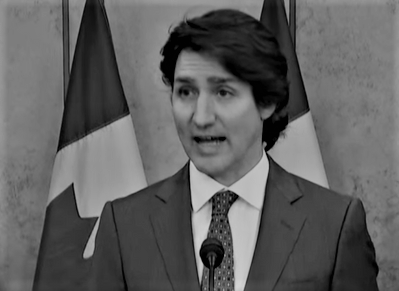February 14, 2022
-CBC
Prime Minister Justin Trudeau says he has invoked the Emergencies Act for the first in time in Canada’s history to give the federal government extra powers to handle ongoing blockades and protests against pandemic restrictions.
“It is now clear that there are serious challenges to law enforcement’s ability to effectively enforce the law,” Trudeau told a news conference Monday afternoon.
Trudeau said the measures will be geographically targeted and “reasonable and proportionate to the threats they are meant to address.”
The unprecedented deployment of the Emergencies Act gives police more tools to restore order in places where public assemblies constitute illegal and dangerous activities, such as blockades and occupations, he said.
The government is also designating and securing critical areas such as border crossings and airports. Invoking the act will also allow the government to make sure that essential services — such as towing services to remove trucks — are rendered, said Trudeau.
The act also permits the federal government to direct financial institutions to render essential services to address the situation, and to prohibit the use of property to fund or support illegal blockades.
Trudeau said the act also will enable the RCMP to enforce municipal bylaws and provincial offences where required.
“This is about keeping Canadians safe, protecting people’s jobs and restoring confidence in our institutions,” said Trudeau.
The Emergencies Act, which replaced the War Measures Act in the 1980s, defines a national emergency as a temporary “urgent and critical situation” that “seriously endangers the lives, health or safety of Canadians and is of such proportions or nature as to exceed the capacity or authority of a province to deal with it.”
The act gives special powers to respond to emergency scenarios affecting public welfare (natural disasters, disease outbreaks), public order (civil unrest), international emergencies or war emergencies.
It grants cabinet the ability to “take special temporary measures that may not be appropriate in normal times” to cope with an “urgent and critical situation” and the resulting fallout. It is still subject to the protections of the Charter of Rights and Freedoms.
Ottawa police have said they are outnumbered by crowds protesting vaccine mandates in the capital. Despite a provincial state of emergency, protesters ignored the threat of arrest and jail time and flocked to the city’s centre over the weekend.
Demonstrators have erected tents, a stage, a large video screen and even a hot tub on various streets — including Wellington Street, which runs in front of the Parliament Buildings and the Prime Minister’s Office.
Ottawa police said “safety concerns” — including “aggressive, illegal behaviour” by demonstrators — are to blame for the “limited police enforcement capabilities.”
A blockade of the Ambassador Bridge in Windsor, Ont., a key supply link between Canada and the U.S., was dispersed by police earlier Sunday, with 12 arrests.
Once cabinet declares an emergency, it takes effect right away — but the government still needs to go to Parliament within seven days to get approval. If either the Commons or the Senate votes against the motion, the emergency declaration is revoked.
NDP Leader Jagmeet Singh said Monday that while he sees the prime minister’s decision to turn to the Emergencies Act as “proof of a failure of leadership,” he will support the declaration — which should secure its passage through a minority Parliament.




